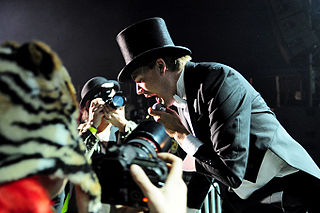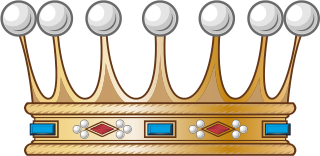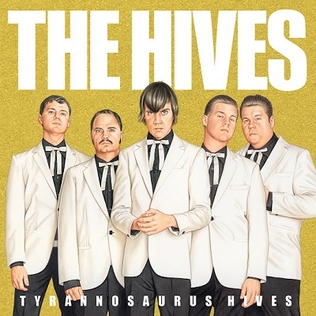A hive may refer to a beehive, an enclosed structure in which some honey bee species are kept by apiarists.

The Hives are a Swedish rock band that rose to prominence in the early 2000s during the post-punk revival. Their mainstream success came with the release of the album Veni Vidi Vicious, containing the anthem "Hate to Say I Told You So". The band has been acclaimed by music critics as one of the best live rock bands in 2012.

A beehive is an enclosed, man-made structure in which some honey bee species of the subgenus Apis live and raise their young. Though the word beehive is commonly used to describe the nest of any bee colony, scientific and professional literature distinguishes nest from hive. Nest is used to discuss colonies which house themselves in natural or artificial cavities or are hanging and exposed. Hive is used to describe an artificial, man-made structure to house a honey bee nest. Several species of Apis live in colonies, but for honey production the western honey bee and the eastern honey bee are the main species kept in hives.

Beekeeping is the maintenance of bee colonies, commonly in man-made hives, by humans. Most such bees are honey bees in the genus Apis, but other honey-producing bees such as Melipona stingless bees are also kept. A beekeeper keeps bees in order to collect their honey and other products that the hive produce, to pollinate crops, or to produce bees for sale to other beekeepers. A location where bees are kept is called an apiary or "bee yard."

An apiary is a location where beehives of honey bees are kept. Apiaries come in many sizes and can be rural or urban depending on the honey production operation. Furthermore, an apiary may refer to a hobbyist's hives or those used for commercial or educational usage. It can also be a wall-less, roofed structure, similar to a gazebo which houses hives.

Baron Henniker, of Stratford-upon-Slaney in County Wicklow, is a title in the Peerage of Ireland. It was created in 1800 for Sir John Henniker, 2nd Baronet, who had previously represented Sudbury and Dover in the House of Commons. His son, the second Baron, also sat as a Member of Parliament. In 1792 he assumed by Royal licence the additional surname of Major. He was childless and was succeeded by his nephew, the third Baron. He assumed the additional surname of Major by Royal licence in 1822. His son, the fourth Baron, represented Suffolk East in Parliament. In 1866 he was created Baron Hartismere, of Hartismere in the County of Suffolk, in the Peerage of the United Kingdom. This title gave him and his descendants an automatic seat in the House of Lords. He was succeeded by his son, the fifth Baron. He also sat as Member of Parliament for Suffolk East and later held minor office in the Conservative administrations of Benjamin Disraeli and Lord Salisbury. His grandson, the eighth Baron, was a prominent diplomat and notably served as British Ambassador to Jordan and to Denmark. As of 2014 the titles are held by the latter's son, the ninth Baron, who succeeded in 2004.

Baron O'Hagan, of Tullahogue in the County of Tyrone, is a title in the Peerage of the United Kingdom. It was created on 14 June 1870 for Sir Thomas O'Hagan, then Lord Chancellor of Ireland. His younger son, the third Baron, served as a Lord-in-waiting from 1907 to 1910 in the Liberal administrations of Sir Henry Campbell-Bannerman and H. H. Asquith and was later a Deputy Speaker of the House of Lords. In 1909 Lord O'Hagan assumed by Royal licence the additional surname of Towneley, which was that of his maternal grandfather. As of 2010 the title is held by his grandson, the fourth Baron, who succeeded in 1961. He is the son of the Hon. Thomas Anthony Edward Towneley Strachey. Lord O'Hagan was a Member of the European Parliament for Devon from 1973 to 1975 and again from 1979 to 1994, first as an independent and later as a Conservative. He assumed in 1938 by deed poll the additional Christian name of Towneley and the surname of Strachey in lieu of his patronymic. Strachey was the surname of his maternal grandfather Edward Strachey, 1st Baron Strachie.

Baron Sudeley is a title that has been created thrice in British history, twice in the Peerage of England and once in the Peerage of the United Kingdom. The first creation came in the Peerage of England in 1299 when John de Sudeley was summoned to Parliament as Lord Sudeley. On the death of the third Baron in 1367 the title fell into abeyance. The abeyance was terminated in 1380 when Thomas Boteler, the fourth Baron, became sole heir. The sixth Baron was created Baron Sudeley by letters patent in 1441. He served as Lord High Treasurer from 1444 to 1447. On his death in 1473 the 1441 creation became extinct while the 1299 creation once again fell into abeyance.

Baron Montagu of Beaulieu, in the County of Hampshire, is a title in the Peerage of the United Kingdom and the Noble House of Montagu. It was created in 1885 for the Conservative politician Lord Henry Montagu Douglas Scott, who had earlier represented Selkirkshire and South Hampshire in the House of Commons. He was the second son of Walter Montagu Douglas Scott, 5th Duke of Buccleuch. His son, the second Baron, sat as a Conservative Member of Parliament for New Forest. The 3rd Baron Montagu of Beaulieu was one of the ninety elected hereditary peers that remain in the House of Lords after the passing of the House of Lords Act 1999, and sat on the Conservative benches. As descendants of the 5th Duke of Buccleuch, the Barons Montagu of Beaulieu are also in remainder to this peerage and its subsidiary titles.

Baron Milford is a title that has been created three times, once in the Peerage of Ireland and twice in the Peerage of the United Kingdom. All three creations have been for members of the same family. The first creation came in the Peerage of Ireland in 1776 when Sir Richard Philipps, 7th Baronet, of Picton Castle was made Baron Milford. However, this title became extinct on his death in 1823, while the baronetcy was passed on to a distant relative. The title was revived in the Peerage of the United Kingdom in 1847 when Sir Richard Philipps, 1st Baronet, of Picton Castle was created Baron Milford, of Picton Castle in the County of Pembroke. Born Richard Bulkeley Philipps Grant, he was the son of John Grant and Mary Philippa Artemisia, daughter of James Child and Mary Philippa Artemisia, daughter of Bulkeley Philipps, uncle of the first Baron of the first creation. He succeeded to the Philipps estates in 1823 and assumed the surname of Philipps the same year. In 1828 he was created a Baronet, of Picton Castle in the County of Pembroke, in the Baronetage of the United Kingdom. However, Lord Milford was childless and the titles became extinct on his death in 1857. He devised his estates to his half-brother Reverend James Henry Alexander Gwyther, who assumed the surname of Philipps. James's daughter Mary Philippa married Charles Edward Gregg, who assumed the surname of Philipps and was created a Baronet, of Picton, in 1887.
Baron Biddulph, of Ledbury in the County of Hereford, is a title in the Peerage of the United Kingdom. It was created in 1903 for the banker and politician Michael Biddulph. He was a partner in the London banking firm of Cocks, Biddulph and Co and also sat in the House of Commons for Herefordshire as a Liberal from 1868 to 1885 and for Ross from 1885 to 1900 as a Liberal Unionist. His father Robert Biddulph had previously represented Hereford in Parliament while his younger brother Sir Robert Biddulph was Governor of Gibraltar. As of 2017 the title is held by the first Baron's great-great-grandson, the fifth Baron, who succeeded his father in 1988. In 1978 he assumed the additional surname of Maitland, which is the maiden surname of his mother, Lady Mary Helena Maitland, granddaughter of Ian Colin Maitland, 15th Earl of Lauderdale. She is a Patroness of the Royal Caledonian Ball.

Baron Churston, of Churston Ferrers and Lupton in the County of Devon, is a title in the Peerage of the United Kingdom. It was created in 1858 for the former Conservative Member of Parliament, Sir John Yarde, 3rd Baronet. He had earlier represented South Devon in the House of Commons. Two years later, in 1860, he assumed by Royal licence the additional surname of Buller. As of 2014 the titles are held by his great-great-great-grandson, the fifth Baron, who succeeded his father in 1991.

Freiherr, Freifrau and Freiin are designations used as titles of nobility in the German-speaking areas of the Holy Roman Empire, and in its various successor states, including Austria, Prussia, Bavaria, Liechtenstein, Luxembourg, etc. Traditionally it denotes the titled rank within the nobility above Ritter (knight) and Edler and below Graf and Herzog (duke). The title superseded the earlier medieval form, Edelherr.

Hives, also known as urticaria, is a kind of skin rash with red, raised, itchy bumps. They may also burn or sting. Often the patches of rash move around. Typically they last a few days and do not leave any long-lasting skin changes. Fewer than 5% of cases last for more than six weeks. The condition frequently recurs.

Tyrannosaurus Hives is the third full-length album by The Hives, released on 20 July 2004. It is their first album since Veni Vidi Vicious from 2000, and also their first original release on a major label.

Cold urticaria is a disorder where hives (urticaria) or large red welts form on the skin after exposure to a cold stimulus. The welts are usually itchy and often the hands and feet will become itchy and swollen as well. Hives vary in size from about 7mm in diameter to as big as about 27mm diameter or larger. This disorder, or perhaps two disorders with the same clinical manifestations, can be inherited or acquired. The acquired form is most likely to occur between ages 18–25, although it can occur as early as 5 years old in some cases. Life-threatening risks include suffocation resulting from pharyngeal angiooedema induced by cold foods or beverages, drowning after shock from swimming in cold water and anaphylactic shock.
Alexander John Henderson Morrison is a British judge, President of the Mental Health Review Tribunal between 1983 and 1998.













